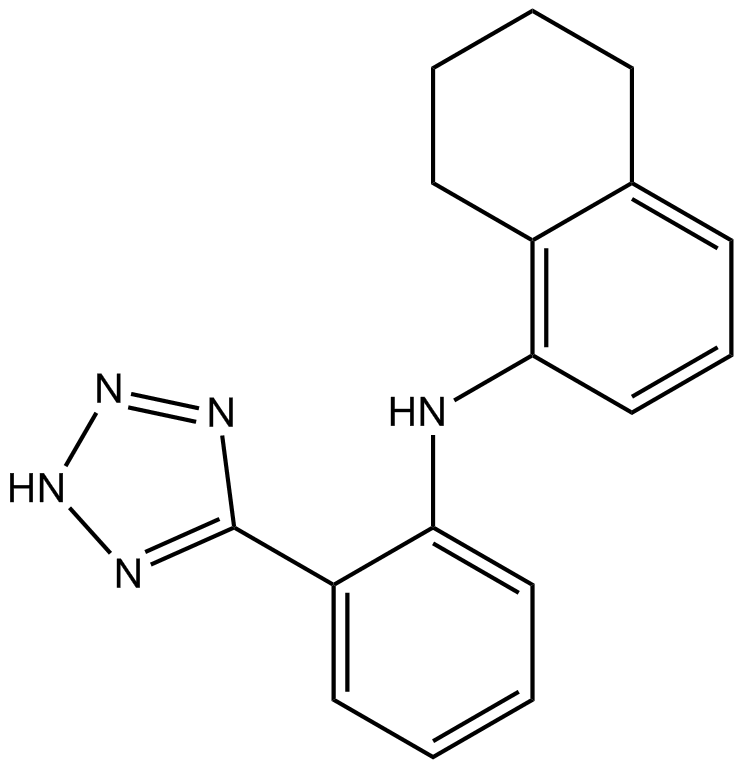BL 1249 |
| Catalog No.GC10094 |
K2P2.1 (TREK-1) channel opener
Products are for research use only. Not for human use. We do not sell to patients.

Cas No.: 18200-13-0
Sample solution is provided at 25 µL, 10mM.
[(5, 6, 7, 8-tetrahydro-naphthalen-1-yl)-[2-(1H-tetrazol-5-yl)-phenyl]-amine], named BL 1249, is a putative potassium channel opener with bladder-relaxant properties. In cultured bladder smooth muscle cells, BL 1249 decreased DiBAC4 (3) fluorescence in a concentration-dependent manner with an EC50 of 1.26 ± 0.6 µM. In human bladder cells, BL 1249 resulted in hyperpolarization in a concentration-dependent manner and yielded an EC50 of 1.49±0.08 µM. BL 1249 relaxed 30 mM KCl precontracted bladder strips in a concentration-dependent manner and yielded an EC50 of 1.1 ± 0.37 µM [1].
There are several types of potassium channels in urinary bladder myocytes and they are important in determining contractility and excitability of bladder smooth muscle. These channels include maxi-K+, KATP, members of the voltage-gated Kv family, SK family and, possibly, members of the KCNQ family. Open potassium channels can increase potassium efflux from the cell and produce membrane potential hyperpolarization, thereby decrease the activation of voltage-dependent calcium channels [1].
In human bladder myocytes, BL 1249 produced large instantaneously non-inactivating, activating outward currents that were readily reversible following drug washout. The BL 1249-induced current was hence of a reversal potential of near -80 mV under the physiological K+ gradient, this indicated that the current is carried by K+ ions [1].
In anesthetized rats, BL 1249 at a concentration of 1 mg/kg significantly decreased (p< 0.01) micturition contractions during the 15-min period immediately following dosing; for the 15- to 30-min period, the decrease was significant but less (p< 0.05). Administration of BL 1249 at a concentration of 1 mg/kg had no effect on mean arterial blood pressure (MABP) during the 0- to 15-min period immediately following administration. During the 15- to 30-min period, BL 1249 administration increased MABP by less than 10% [1].
Reference:
[1]. Svetlana Tertyshnikova, Ronald J. Knox, Mary Jane Plym, et al. BL-1249 [(5, 6, 7, 8-Tetrahydro-naphthalen-1-yl)-[2-(1H-tetrazol-5-yl)-phenyl]-amine]: A Putative Potassium Channel Opener with Bladder-Relaxant Properties. The Journal of Pharmacology and Experimental Therapeutics, 2015, 313(1):250-259.
Average Rating: 5 (Based on Reviews and 6 reference(s) in Google Scholar.)
GLPBIO products are for RESEARCH USE ONLY. Please make sure your review or question is research based.
Required fields are marked with *




















